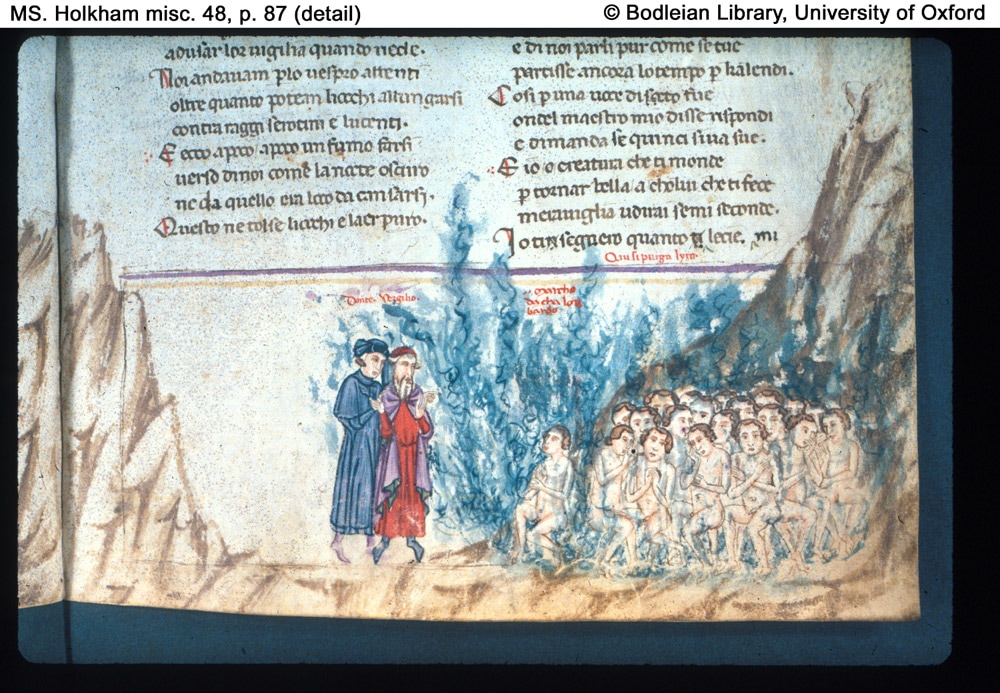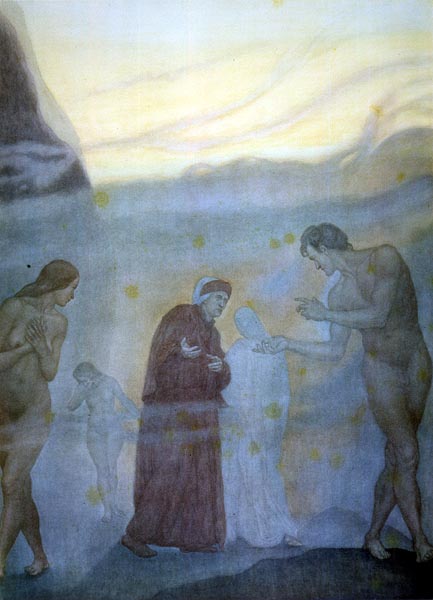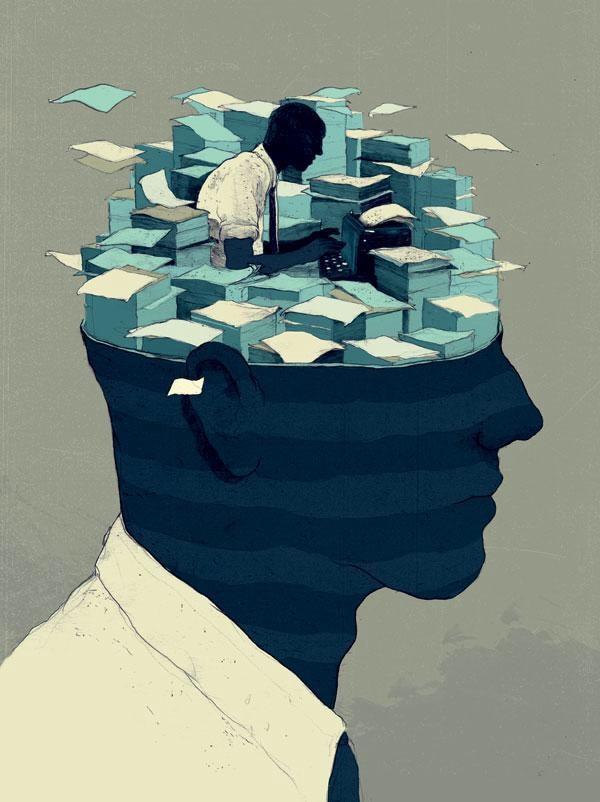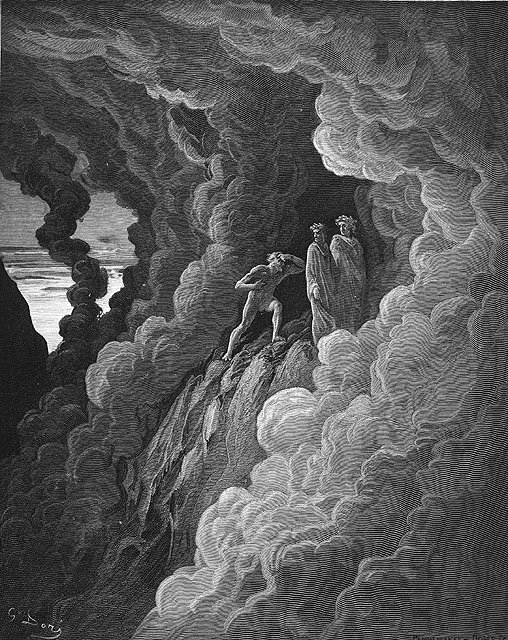Just as Dante the Pilgrim began this journey in the Commedia in the midway point of his life, so too are we at the very midway point of the entire Commedia. In a work of such intentionality and art, we must expect Dante the Poet to appreciate the importance of this place in the overall architecture of his great poem. And he does. Canto 16 and Canto 17 bring us themes and reflections that are crucial to the full understanding of the Medieval worldview and our place in it.
We are now on the Terrace or Circle of Anger, and it is immediately likened to the darkness of Hell.
1 Gloom of hell or of a night deprived
Buio d'inferno e di notte privata
2 of all the stars, beneath a barren sky
d'ogne pianeto, sotto pover cielo,
We are reminded of the fact that in Hell [d’inferno] there were no stars, there was anger and smoke and loss of reason. Yet here, the very environment which was cause for punishment in Hell is now used to purge and heal and restore reason. Anger causes one to act without thinking, to lose one’s balance and perspective. Hence Virgil encourages Dante the Pilgrim to keep his hand firmly on Virgil’s shoulder, as he, Reason Incarnate, will help guide him through the smoke of Wrath. Indeed, we will find here Marco Lombardo giving us a fully reasoned explanation of free will within the current Medieval worldview. Dante the Pilgrim promises to pray for Marco once he returns topside, but he is bursting at the seams with unanswered questions. Marco, therefore, will guide them through the smoke and lead them both physically and pedagogically through the darkness toward the light.
Dante the Pilgrim wants to know why the world is so messed up. Not only has he witnessed Hell packed full of evil, self-referent, hateful individuals, but obviously Purgatory has no shortage either and there is amassed at the base of the Seven Storey Mountain a great throng still waiting to even begin the cleansing trek. He wonders where such evil and sinful folk come from? Are they forced to act as they do, maybe by the action of the stars, or do they have free will?
58 'The world is barren now
Lo mondo è ben così tutto diserto
59 of every virtue, as you state,
d'ogne virtute, come tu mi sone,
60 and heavy with and overgrown by evil.
e di malizia gravido e coverto;
61 'Please point out to me the cause
ma priego che m'addite la cagione,
62 that I may know it and make it known to others,
sì ch'i' la veggia e ch'i' la mostri altrui;
63 for both the heavens and the earth receive the blame.'
ché nel cielo uno, e un qua giù la pone."
The astrological determinism represented here is now alive and well in the scientific determinism in today’s descendants of B. F. Skinner. According to a growing school of thought, we have no free will. In fact, we only move and make choices as a result chemical and neurological activity and dendrite integrity. This concept and belief has gained such momentum that we now have scientists attempting to convince other scientists that in fact we DO have free will. In Scientific American, January 2015, Eddy Nahmias wrote an article entitled “Why We Have Free Will.” Part of the brief at the beginning of the article states:
Neurons fire in your head before you become aware that you have made a decision. But this discovery does not mean you are a “biochemical puppet” … A major question in neuroscience, in philosophy and in broader public debate is whether the assumption that we have free will is fundamentally misconstrued. If it is, many legal and moral precepts that are the basis for our social institutions are subject to challenge.
70 'If that were so, free choice would be denied you,
Se così fosse, in voi fora distrutto
71 and there would be no justice when one feels
libero arbitrio, e non fora giustizia
72 joy for doing good or misery for evil.
per ben letizia, e per male aver lutto.
In fact, he remarks that even if the stars or one’s physical surroundings do exude an influence on one, even then practiced efforts to resist bad actions and enforce good behavior will still result in more and more free will, “you have free will … and rightly nurtured it can conquer all.” [vss 73-78] Nahmias makes the very same point in his Sci. American article: “People may have less free will than they think, but that does not mean they have none at all. A number of recent experiments by social psychologists have shown that conscious reasoning and intentions have a significant impact on our actions.” We must never forget that Dante was steeped not only in Christian Scholastic Theology, but also in mathematics, political science, philosophy and classical mythology and literature. [Dante rocks!]
Marco Lombardo will turn to Scholastic theology again to describe how and why there is evil in the current culture, but first we have a lovely introduction of God as a playful, loving Creator. There is no sense of a new soul coming from God like a blank slate [tabula rasa], as in Aquinas or John Locke. Instead, Dante the Poet has Lombardo describing a newly arrived soul as a feminine presence that is playful and inquisitive; the anima filled with joy!
85 'From the hand of Him who looks on it with love
Esce di mano a lui che la vagheggia
86 before it lives, comes forth, like a little girl
prima che sia, a guisa di fanciulla
87 who weeps one moment and as quickly laughs,
che piangendo e ridendo pargoleggia,
88 'the simple infant soul that has no knowledge
l'anima semplicetta che sa nulla,
89 but, moved by a joyous maker,
salvo che, mossa da lieto fattore,
90 gladly turns to what delights it.
volontier torna a ciò che la trastulla.
There is interest, joy, play, love and laughter all at the core of our creation in this vision. This, of course, is what makes the following explanation so damning. The lovely new soul is led astray because the principalities of this world have not claimed their God-given places and responsibilities. Originally, in Medieval theology, there were two lights in the sky that represented the two God appointed powers to rule and guide humanity. The sun, the source of light, was to represent the Church. The moon, reflecting the light of the sun, was to represent the Emperor, or political power. Dante the Poet, as a seasoned political thinker, changes this and gives them both equal status: two suns. And yet, the leading astray of all humanity is because the Church has tried to be both sacred and secular. It has dirtied itself by trying to be both Emperor and Pope. They both should have been wise guides in their own areas, but now all is based on power and greed.
103 'As you can plainly see, failed guidance
Ben puoi veder che la mala condotta
104 is the cause the world is steeped in vice…
è la cagion che 'l mondo ha fatto reo,
There will certainly be more about this in the next Canto and then even more fully explained by Beatrice when we ready ourselves to enter heaven. Find a version with good commentary and then read this and the next Canto 17 several times over. I don’t command you. You have the free will to choose. Choose wisely!




 RSS Feed
RSS Feed
